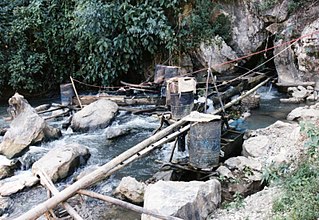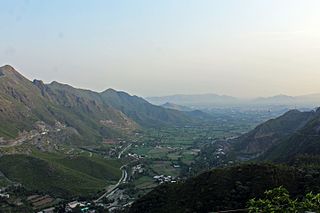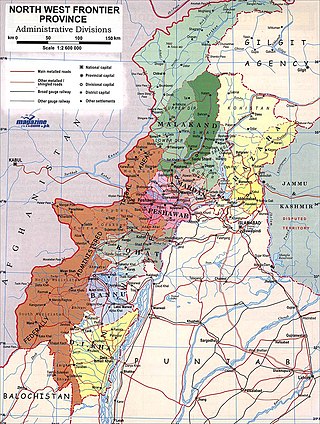Related Research Articles
Dargai is one of the tehsils of Malakand District in Pakistan's northwestern Khyber Pakhtunkhwa province. It located on the main highway from Peshawar to Swat, Dir and Chitral.

Micro hydro is a type of hydroelectric power that typically produces from 5 kW to 100 kW of electricity using the natural flow of water. Installations below 5 kW are called pico hydro. These installations can provide power to an isolated home or small community, or are sometimes connected to electric power networks, particularly where net metering is offered. There are many of these installations around the world, particularly in developing nations as they can provide an economical source of energy without the purchase of fuel. Micro hydro systems complement solar PV power systems because in many areas water flow, and thus available hydro power, is highest in the winter when solar energy is at a minimum. Micro hydro is frequently accomplished with a pelton wheel for high head, low flow water supply. The installation is often just a small dammed pool, at the top of a waterfall, with several hundred feet of pipe leading to a small generator housing. In low head sites, generally water wheels and Archimedes' screws are used.

The University of Malakand is a Public Sector University located in the Lower Dir District of Khyber Pakhtunkhwa, Pakistan. Founded in 2001, the university offers undergraduate and postgraduate programmes in various academic disciplines. In 2010, the university was ranked "seventh" in the general category in Pakistan by the Higher Education Commission of Pakistan.

Dir was a princely state in a subsidiary alliance with the British Raj, located within the North-West Frontier Province. Following the Partition of British India, Dir remained independent and unaligned until February 1948, when the Dominion of Pakistan accepted its accession.

Malakand District is a district in the Malakand Division of the Khyber Pakhtunkhwa province of Pakistan.

Pico hydro is a term used for hydroelectric power generation of under 5 kW. These generators have proven to be useful in small, remote communities that require only a small amount of electricity – for example, to power one or two fluorescent light bulbs and a TV or radio in 50 or so homes. Even smaller turbines of 200–300 W may power a single home with a drop of only 1 metre (3.3 ft). Pico-hydro setups typically are run-of-stream, meaning that a reservoir of water is not created, only a small weir is common, pipes divert some of the flow, drop this down a gradient, and through the turbine before being exhausted back to the stream.
The South Somerset Hydropower Group (SSHG) is a group of 10 owners of former watermills in the South Somerset area of England who are installing micro-hydro turbines for electricity generation. The Group was founded as a result of an initiative by South Somerset District Council, and was the first of its kind in the United Kingdom. The Group won one of the 2005 Ashden Awards, and the concept has been adopted by a number of other similar groups.

The Malakand Agency was one of the agencies in the North West Frontier Province of British India and later of Pakistan until 2010. It included the princely states of Chitral, Dir and Swat, and an area around the Malakand Pass known as the Malakand Protected Area. The largest city in the area was Mingora, while the three state capitals were Chitral, Dir, and Saidu Sharif. In 1970, following the abolition of the princely states, the agency became the Malakand Division, which was divided into districts, one of which was the Malakand Protected Area, known as Malakand District. In 2000 the Malakand Division was abolished. Despite the constitutional changes since 1970, the expression Malakand Agency is still used, sometimes of the entire area of the former Agency, but more often of Malakand District.
The Aga Khan Rural Support Programme (AKRSP) is a private, non profit organization, established by the Aga Khan Foundation in 1982 to help improve the quality of life of the villagers of Gilgit-Baltistan and Chitral. It is a Non Governmental Organization which is part of the Rural Support Programmes Network in Pakistan.

Shoaib Sultan Khan NI is one of the pioneers of rural development programmes in Pakistan. As a CSP Officer, he worked with the Government of Pakistan for 25 years, later on he served Geneva based Aga Khan Foundation for 12 years, then UNICEF and UNDP for 14 years. Since his retirement, he has been involved with the Rural Support Programmes (RSPs) of Pakistan full-time, on voluntary basis. Today, the Rural Support Programmes have helped form 297,000 community organisations in 110 districts including two Federally Administered Tribal Areas of Pakistan.
Masood ul-Mulk TI is a Pakistani expert on humanitarian aid and a development practitioner. He is the CEO of SRSP the largest NGO working to alleviate poverty in North-West Pakistan.
The Sarhad Rural Support Programme (SRSP) is the largest non-governmental organization working to alleviate poverty in North West Pakistan. It was established in 1989 with the aim of reducing poverty and ensuring sustainable means of livelihood in what is now Khyber Pakhtunkhwa, Pakistan. SRSP is part of the Rural Support Programmes (RSP's) initiated by United Nations Environment Programme Global 500 Award winner Shoaib Sultan Khan. It is now the largest regional RSP, with extensive outreach into communities. In recent years because of its vast outreach, SRSP has had to play a prominent role in disasters that have hit Khyber Pakhtunkhwa. As a result, humanitarian work along with development has become a core competency of the organization.
Concept of smart villages is a global modern approach for off-grid communities. Vision behind this concept is to assist the policy makers, donors and socio-economic planner for rural electrification worldwide.
Community Driven Local Development (CDLD) is a budgetary support programme meant to bring social and structural improvements in Thirteen districts of Khyber Pakhtunkhwa, in Khyber Pakhtunkhwa, Pakistan.
The People's Primary Healthcare Initiative KP (PPHI), also known as Khyber Pakhtunkhwa Health Programme, is a programme with the objective of developing primary level healthcare facilities to benefit patients at grassroots level, in the province of Khyber Pakhtunkhwa and Federally Administered Tribal Areas, Pakistan.
Access to justice is a basic principle in rule of law which describes how citizens should have equal access to the justice system and/or other justice services so that they can effectively resolve their justice problems. Without access to justice, people are not able to fully exercise their rights, challenge discrimination, or hold decision-makers accountable for their actions.
Development programs in Tribal Areas are the various humanitarian, development and relief projects carried out by the Sarhad Rural Support Programme (SRSP) in the Federally Administered Tribal Areas (FATA) of Pakistan.

The Dir Levies is a paramilitary force in the Dir District of the Pakistani province of Khyber Pakhtunkhwa. It operates as the primary law enforcement agency tasked with maintaining law and order within the division. The force has its origins back in the days of the British Raj, and has continued to function for over a century.
The Dir–Chitral Motorway is a proposed motorway project in the Khyber Pakhtunkhwa province of Pakistan. The project aims to provide a major boost to tourism and trade activities throughout the region.
References
- ↑ "Tar Patar finds light at the end of the tunnel". The Express Tribune. 15 June 2015.
- ↑ "PTI-led KPK govt inaugurates micro hydro project in Kalam". The Newsteller. 28 May 2015.
- ↑ Khankhel, Essa (30 November 2016). "EU to continue support for development of marginalised areas: Ambassador". The News International.
- ↑ Dobbs, Ellen; Wheldon, Anne; Sharma, Chhavi (7 October 2016). "15 years of development in access to off-grid renewable electricity: insights from the Ashden Awards". Field Actions Science Reports. The Journal of Field Actions (Special Issue 15): 150–159. ISSN 1867-139X.
- ↑ "Empowering local communities: Olive trees spell greener days for Lower Dir's farmers". The Express Tribune. 31 March 2015.
- ↑ "KP govt implementing reform agenda: Khattak". The News International. 14 August 2016.
- ↑ "Technical Appraisal and Monitoring of a Micro-Hydel Programme in Pakistan". Hydro Engineering Institute Sarajevo. 4 January 2014.
- ↑ "Work on EU-funded power project launched". The News International. 18 March 2015.
- ↑ "Use of electric dryers brings dividend for Swat fruit farmers". DAWN. 18 March 2015.
- ↑ Farooqui, Gul Hammad (26 July 2016). "150 KV Micro Hydro Power House inaugurated in Chitral". ARY News.
- ↑ Khaliq, Fazal (27 February 2016). "Villagers happy as they get a bridge". DAWN.
- ↑ "CM reiterates commitment to community development". The News International. 12 November 2015.
- ↑ "3 micro-power projects completed in far-off Chitral villages". The News International. 26 August 2016.
- ↑ "EU ambassador inaugurates power station in Swat". DAWN. 1 December 2016.
- ↑ Cheema, Abdur Rehman (11 March 2016). "Women benefit most from 'smart villages' in Pakistan's Hindu Kush". DAWN.
- ↑ "Power up: Hydro project to light up 13,000 houses in Chitral". The Express Tribune.
- ↑ "New initiatives: PTI chairman promises a "different" LG system". The Express Tribune. 27 August 2013.
- ↑ "Ashuran Power House starts production in Kalam". The News International. 31 October 2016.
- ↑ "Project good example of govt-donor collaboration: Ambassador Cautain". The News International. 1 December 2016.
- ↑ "Son, you brought electricity to the village and added 15 years to my life". The Guardian. 12 June 2015.
- ↑ "Power plant inaugurated in Upper Dir". Pakistan Herald. 24 May 2016.
- ↑ "Make your own electricity: A tale of Swat's restless heroes". DAWN. 10 June 2015.
- ↑ "KP to generate 100MW micro-hydropower projects". The News International. 29 August 2016.
- ↑ "At long last: Kalam gets electricity after six years". The Express Tribune. 7 July 2014.
- ↑ "Bringing hydro power to the rural areas of Pakistan". GNESD Energy Access Knowledge Based.
- ↑ "Road link to Chitral village restored after four years". DAWN. 6 November 2014.
- ↑ "Bridge brings joy to remote villages in Chitral". The News International. 6 November 2014.
- ↑ "Timely assistance: Solar plants provided to Chitral hospitals". 6 December 2015.
- ↑ "Lowari Tunnel: Chitral left out in the cold - The Express Tribune". The Express Tribune. 4 March 2014.
- ↑ "Winner case study summary: Sarhad Rural Support Programme, Pakistan" (PDF). Ashden Award for Increasing Energy Access, supported by the IKEA Foundation Award. 2015.
- ↑ "The power of water brings new life to mountain villages". Ashden Awards, sustainable and renewable energy in the UK and developing world. 5 June 2015.
- ↑ "Awards & Recognitions | RSPN". Rural Support Programmes Network (RSPN).
- ↑ Cheema, Abdur Rehman (12 March 2016). "What the 'smart villages' of Pakistan can teach us about energy". Scroll.in.
- ↑ Cheema, Abdur Rehman (10 March 2016). "The "smart villages" of northern Pakistan". The Third Pole.
- ↑ Cheema, Abdur Rehman (21 July 2015). "Hurry up with the micro hydro". Earth Journalism Network.
- ↑ Butler Sloss, Sarah (2015). "Blazing the Trail : Our Planet". United Nations Environment Programme (UNEP).
- ↑ "Green energy awards seek sustainable energy pioneers in Asia". Eco-Business. 8 September 2015.
- ↑ Ashden Award Ceremony, 6 September 2016
- ↑ "National Energy Globe Award Pakistan 2017". Energy Globe.